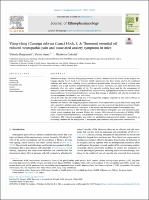Por favor, use este identificador para citar o enlazar este ítem:
https://repositorio.usj.es/handle/123456789/849
Registro completo de metadatos
| Campo DC | Valor | Lengua/Idioma |
|---|---|---|
| dc.contributor.author | Borgonetti, Vittoria | - |
| dc.contributor.author | López Ramos, Víctor | - |
| dc.contributor.author | Galeotti, Nicoletta | - |
| dc.date.accessioned | 2022-09-16T13:06:06Z | - |
| dc.date.available | 2022-09-16T13:06:06Z | - |
| dc.date.issued | 2022-05-10 | - |
| dc.identifier.citation | Borgonetti, V., Les, F., López, V., Galeotti, N., 2022. Ylang-ylang (Cananga odorata (Lam.) Hook. f. & Thomson) essential oil reduced neuropathic-pain and associated anxiety symptoms in mice. Journal of Ethnopharmacology, 294 doi: https://doi.org/10.1016/j.jep.2022.115362 | es_ES |
| dc.identifier.issn | 0378-8741 | es_ES |
| dc.identifier.uri | https://repositorio.usj.es/handle/123456789/849 | - |
| dc.description.abstract | Ethnopharmacological relevance: Ylang-ylang essential oil (YEO), obtained from the flowers of the tropical tree Cananga odorata (Lam.) Hook. f. & Thomson (family Annonaceae), has been largely used in the traditional medicine with many uses, including anxiety and altered neuronal states. Neuropathic pain is a chronic pain condition with a high incidence of comorbidities, such as anxiety, depression, and other mood disorders, that drastically affect the patient’s quality of life. The currently available drugs used for the management of neuropathic pain are inadequate due to poor efficacy and tolerability, highlighting the medicinal need of a better pharmacotherapy. Several clinical studies have reported that massage or inhalation with selected essentials oils reduces symptoms associated to pain and anxiety. Aim of the study: The aim of this study was to investigate the analgesic properties of YEO and its efficacy in reducing neuropathy-associated mood alterations. Materials and methods: The analgesic properties were tested in the spared nerve injury (SNI) model using male mice. Anxiolytic, antidepressant, and locomotor properties were also evaluated using behavioural tests. Finally, the YEO mechanism of action was investigated in the spinal cord and hippocampus of neuropathic mice. Results: Oral administration of YEO (30 mg/kg) reduced SNI-induced neuropathic pain and ameliorates painrelated anxiety symptoms that appeared 28 days after surgery. YEO reduced the expression of MAPKs, NOS2, p-p65, markers of neuroinflammation, and promoted normalizing effect on neurotrophin levels (BDNF). Conclusions: YEO induced neuropathic pain relief and ameliorated pain-associated anxiety, representing an interesting candidate for the management of neuropathic pain conditions and pain-related comorbidities. | es_ES |
| dc.format.extent | 7 p. | es_ES |
| dc.format.mimetype | application/pdf | es_ES |
| dc.language.iso | eng | es_ES |
| dc.publisher | Elsevier | es_ES |
| dc.relation | The experimental work was mainly supported by grants from the Universit`a degli Studi di Firenze. Pranarom International is also thanked for financial support. | es_ES |
| dc.rights | Atribución 4.0 Internacional | * |
| dc.rights.uri | http://creativecommons.org/licenses/by/4.0/ | * |
| dc.subject | Ylang-ylang | es_ES |
| dc.subject | Essential oils | es_ES |
| dc.subject | Neuropathic pain | es_ES |
| dc.subject | Anxiety | es_ES |
| dc.subject | Aromatherapy | es_ES |
| dc.subject | Neuroinflammation | es_ES |
| dc.title | Ylang-ylang (Cananga odorata (Lam.) Hook. f. & Thomson) essential oil reduced neuropathic-pain and associated anxiety symptoms in mice | es_ES |
| dc.type | info:eu-repo/semantics/article | es_ES |
| dc.identifier.doi | https://doi.org/10.1016/j.jep.2022.115362 | es_ES |
| dc.rights.accessrights | info:eu-repo/semantics/openAccess | es_ES |
| Aparece en las colecciones: | Artículos de revistas | |
Ficheros en este ítem:
| Fichero | Descripción | Tamaño | Formato | |
|---|---|---|---|---|
| Ylang-ylang (Cananga odorata (Lam.).pdf | 2,34 MB | Adobe PDF |  Visualizar/Abrir |
Este ítem está sujeto a una licencia Creative Commons Licencia Creative Commons

